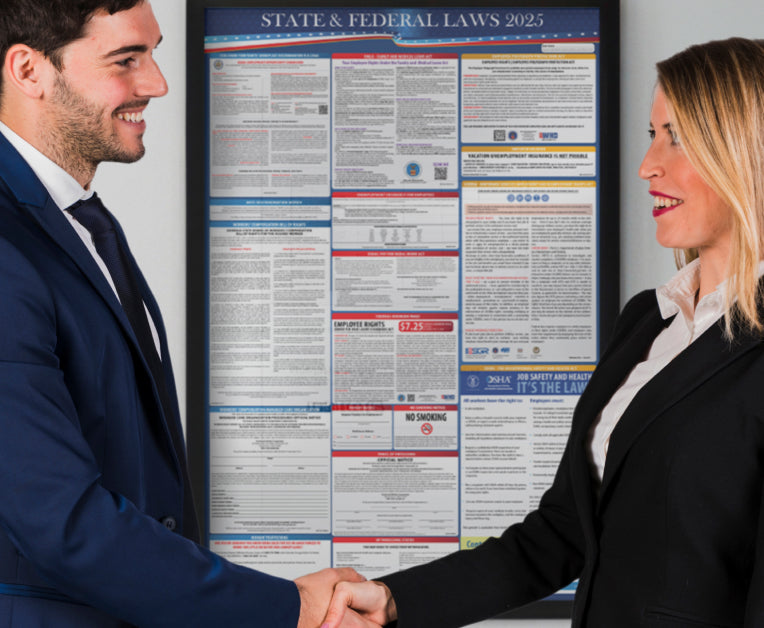
Labor Law Poster Compliance for Concert Venues and Event Spaces: Essential Guidelines
Concert venues and event spaces are dynamic, fast-paced environments that rely on a diverse team of employees, from security personnel and stagehands to ticketing staff and concession workers. Amid the excitement and operational demands, labor law compliance can easily be overlooked, particularly when it comes to posting federally and state-mandated labor law posters.
These posters are not just a legal formality—they are a critical tool for ensuring that all employees know their rights, promoting transparency, and protecting your venue from costly fines or legal disputes.
This comprehensive guide explores why labor law posters are vital for concert venues and event spaces, where to display them, how to keep them updated, accessibility considerations, and strategies to maintain compliance across multiple events or locations.
Why Labor Law Posters Are Critical in Concert Venues and Event Spaces
Concert venues and event spaces often operate with a mix of full-time, part-time, and seasonal staff, as well as volunteers. Each of these team members has legal rights that must be clearly communicated through labor law posters. Key areas covered include:
- Minimum wage and overtime regulations
- Workplace safety standards, including OSHA compliance
- Anti-discrimination and equal employment opportunity protections
- Family and medical leave entitlements
Properly displayed posters protect both employees and venue owners, reduce legal exposure, and foster a transparent work environment. For guidance on how small businesses handle poster compliance, see: Why Every Small Business Must Prioritize Labor Law Poster Compliance.

Understanding Labor Law Poster Requirements for Event Spaces
Federal Requirements
All concert venues and event spaces must comply with federal labor posting requirements, including:
- Fair Labor Standards Act (FLSA): Covers minimum wage, overtime, and child labor laws
- Occupational Safety and Health Act (OSHA): Addresses workplace safety and reporting procedures
- Family and Medical Leave Act (FMLA): Ensures job-protected leave
- Equal Employment Opportunity (EEO): Protects against workplace discrimination
Regardless of venue size or ticket volume, these posters are legally required.
State-Specific Requirements
States often have additional posting requirements. Examples include:
- California: Workers’ compensation, disability insurance, and harassment prevention posters
- New York: Paid family leave and wage law posters
- Texas: Unemployment benefits and anti-discrimination notices
Non-compliance with state-specific postings can result in fines separate from federal penalties.
For more guidance on agency and multi-location compliance, see: Labor Law Poster Compliance for Marketing and Advertising Agencies: Essential Guidelines.
Strategic Placement of Posters in Concert Venues and Event Spaces
Proper poster placement ensures employees can easily access and read them, even in fast-paced event environments.
1. Employee Break Areas
Backstage lounges, green rooms, or staff-only areas are ideal for poster placement. These are spaces where employees spend downtime, increasing the likelihood they will review the information.
2. Entrances and Exits
High-traffic areas like staff entrances, ticket booths, or main hallways ensure maximum visibility.
3. Timekeeping Stations
Clock-in areas, scheduling boards, or digital time-tracking stations are natural locations for posters, ensuring repeated exposure for hourly employees.
4. Near Management Offices
Even smaller venues should place posters near administrative or manager offices, giving employees direct access to compliance information and a contact for questions.
5. Multi-Venue or Touring Considerations
For venues that operate across multiple locations or organize touring events, ensure physical posters are consistent at each site. Digital copies can supplement physical posters but cannot replace them.
Accessibility Considerations
Concert venues employ diverse staff, including multilingual and differently-abled employees, making accessibility essential:
- Eye-Level Placement: Place posters approximately 57–60 inches from the floor for visibility
- Multilingual Versions: Provide translations if employees speak multiple languages
- Disability Accessibility: Include Braille, large-print, or digital formats in accordance with ADA requirements
Accessible posters ensure that all employees understand their rights, minimizing misunderstandings and compliance risks.
Keeping Labor Law Posters Updated
Labor laws frequently change, and staying current is crucial for compliance.
Assign Responsibility
Designate a staff member or manager to monitor updates and implement changes promptly.
Automated Poster Services
Subscription services can automatically deliver updated posters to all venues, ensuring consistent compliance and reducing administrative burden.
Review Schedule
- Federal Updates: Check annually or upon DOL notifications
- State Updates: Review when state labor departments release updates
- Immediate Implementation: Apply changes as soon as legislative updates occur
Common Compliance Challenges in Concert Venues
Event spaces face unique challenges due to their operational nature:
- High Turnover: Seasonal staff or volunteers increase the need for accessible posters
- Temporary or Touring Staff: Ensuring posters are available at each location or event
- Multiple Locations: Maintaining consistent compliance across venues
- Digital vs. Physical Confusion: Reliance on digital postings alone is insufficient
Clear policies, regular audits, and staff education are critical to overcoming these challenges.
Legal and Financial Risks of Non-Compliance
Failing to comply with labor law poster requirements exposes venues to:
1. Fines and Penalties
Federal and state agencies can issue fines for missing, outdated, or improperly displayed posters, which can compound across events and venues.
2. Employee Complaints
Employees may file complaints if posters are not visible or up-to-date, potentially triggering:
- Investigations by labor departments
- Legal disputes or settlements
- Administrative costs and operational disruptions
3. Increased HR Burden
Non-compliance forces staff to divert attention from critical event operations to address compliance issues.
4. Reputation Risk
Concert venues rely on reputation with staff, performers, and audiences. Non-compliance can undermine trust, affect staff retention, and damage community perception.
Best Practices for Venue Compliance
- Centralize Responsibility: Assign a compliance lead for all venues or events
- Automate Updates: Use subscription services for timely poster delivery
- Educate Staff: Ensure employees know where posters are and understand their importance
- Ensure Accessibility: Provide multilingual and ADA-compliant posters
- Conduct Regular Audits: Schedule quarterly or semi-annual checks to confirm posters are current and visible
Implementing these strategies reduces risk, fosters transparency, and demonstrates professionalism in event operations.
Digital Posting in Event Spaces
While physical posters are legally required, digital posting can supplement compliance, especially for large venues or touring events:
- Upload posters to internal portals or mobile apps
- Notify staff of updates via email or internal messaging
- Ensure digital versions are accessible and ADA-compliant
Digital posting enhances accessibility but cannot replace physical poster requirements.
Compliance as a Cornerstone of Venue Operations

Proper labor law poster compliance is more than a legal requirement—it reflects a commitment to ethical operations, employee rights, and workplace safety. For concert venues and event spaces, compliance:
- Builds employee trust and engagement
- Reduces legal and financial risk
- Enhances operational efficiency
- Strengthens reputation with performers, staff, and patrons
Embedding compliance into daily operations ensures venues run smoothly while maintaining professional standards.
Labor law posters are critical for concert venues and event spaces, regardless of size or number of events. Correct placement, accessibility, and timely updates protect employees, safeguard the venue, and promote a culture of transparency and professionalism.
By implementing proactive compliance strategies—centralizing responsibility, using automated updates, conducting regular audits, and ensuring accessibility—venues can avoid fines, legal disputes, and operational disruptions.


